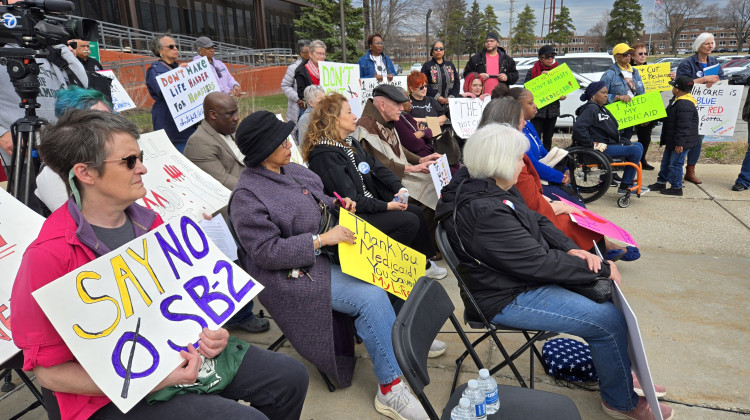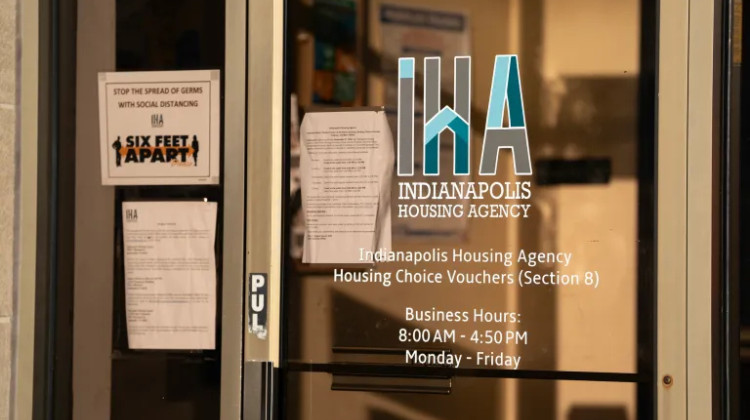
The Indianapolis Public Library’s new Eagle branch on Moller Road has color-coded sections to eliminate a possible language barrier for patrons.
Tyler Fenwick/Indianapolis RecorderThe search for a new CEO for the Indianapolis Public Library is almost complete.
The two finalists for the position, Nichelle M. Hayes and Gabriel Morley, gave public presentations Nov. 30 at Clowes Auditorium at Central Library, laying out their vision for the future of the library.
The program was moderated by Brian Hare of Bradbury Miller Associates. Each candidate had 10-12 minutes to speak about how they would “lead the organization toward future success,” Hare said. The library’s previous CEO, Jackie Nytes, resigned in August 2021 amid allegations of racism.
Up first was Morley, who earned a master’s in business administration from Western Governors University as well as a master’s in library science and a doctorate in adult education from the University of Southern Mississippi. Morley’s presentation lasted roughly 25 minutes. He shared stories of how he helped modernize and restructure other libraries, such as leading a $275 million capital improvement program in Atlanta.
“Part of what I’m going to be proposing today is a reformation — a rethinking about the way we approach libraries and how we think about libraries,” he said.
Morley said his plan for IndyPL is three-pronged to set a new standard for libraries. His plan includes ideas such as shared governance — which would integrate stakeholder participation and accountability at all levels of the organization — enhanced communication and a “culture of care.”
“This is about getting people to engage in what we’re doing,” he said. “It’s truly about taking a step forward, right, not a step back or a step sideways.”
Morley said he aims to have employees interact with each other and with patrons in meaningful ways. The culture of care would seek to better understand employees’ experiences in order to increase engagement.
“My thinking around this culture of care is that we’re constantly working with employees to make their experience better in an effort to increase patron experience,” Morley said. “That’s been the goal of the library for 2,000 years, right? It’s to make communities better, to uplift communities.”
Hayes, who is currently serving as the library’s interim CEO, said her vision for IndyPL is to continue on “a path of positive change.” This includes pushing wages above market, creating a safe and welcoming environment, evaluating and restructuring the system and continuing diversity, inclusion, culture and equity initiatives.
“I want us to be an employer of choice,” said Hayes, who is also the first manager for the Center for Black Literature and Culture. “That means when we have openings, I want other people to say, ‘You want to go work at the library, it’s a good place to work, they’re good people, they have a mission.’”
During her time as interim CEO, Hayes said the library has done good work, but there is still more to do. For instance, she said they have to be comfortable having uncomfortable conversations and better represent the communities the library is meant to serve.
Additionally, Hayes said she wants to educate the community on “freedom to read” in light of the growing controversy surrounding book banning.
“We know there are a lot of people that are protesting books and wanting to ban books,” she said. “We have a plethora of books in our system, both physical and virtual, and if you don’t like a book, let me tell you a secret: You actually don’t have to read it.”
During the Q&A portion of the event, audience members had a chance to write questions, which were presented to each of the candidates. In response to a question about book banning, Morley said he’d like to see the library come up with a policy that outlines its core values and what it will and will not tolerate.
“Having that policy vetted by an attorney so we can make sure that we’re on good legal grounds and then trying to stand firm,” he said. “What we don’t want to do is engage in this back-and-forth with people because we’re never going to win that argument.”
Hayes restated her earlier sentiment about freedom to read, adding that labeling books as “dangerous” will have kids running straight toward them.
“We can’t make librarians scared about doing their job,” she said. “We can’t threaten to send them to jail because they’re giving a child a book.”
On the topic of the library’s role in responding to homelessness, Morley said it all depends on “where you are and how much control you have.”
“For example, we tried to design the library in a way that would be accommodating but that would also not encourage nine or 10 hours of loitering every day,” he said of his previous library experience. “We tried to design the libraries in a way that provided enough computers that we cut down on the wait times and the frequent frustrations that come from not having enough access to technology.”
Hayes said most of those individuals who are homeless are just like other patrons.
“It’s important for us to treat them with respect and courtesy,” she said. “There’s a small percentage that kind of really go and cause us some challenges. The library cannot bear all of the burdens of the problems we have with people experiencing homelessness, so we really got to bring in other community partners.”
When asked what they valued most in library programming, Morley said he valued return on investment. If the library provided programming on things people were interested in like they did books, Morley said they’d see a “healthier attendance.”
Hayes said she values having a variety of programming that really seeks to engage people is. For example, Hayes spoke of a program at the Center for Black Literature and Culture where people come in and read Frederick Douglass.
“We were just simply reading a speech that was almost 100 years old and then we talked about that,” she said. “There were no bells, no whistles, no food, no music, no dancers, it was just engagement and thought and connecting with each other.”
Since April of 2022, IndyPL’s Board of Trustees’ Diversity, Policy & HR Committee has worked with a CEO search committee to bring in candidates for consideration. Following the presentations, the board will conduct closed interviews with the candidates before making an offer. More information can be found at indypl.org.
Contact staff writer Chloe McGowan at 317-762-7848. Follow her on Twitter @chloe_mcgowanxx.
 DONATE
DONATE






 Support WFYI. We can't do it without you.
Support WFYI. We can't do it without you.